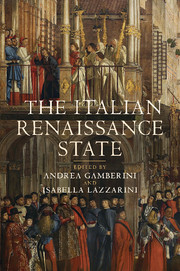Book contents
- Frontmatter
- Contents
- Notes on the contributors
- Note on translations and usage
- Map
- Introduction
- Part I The Italian states
- Part II Themes and perspectives
- 12 The collapse of city-states and the role of urban centres in the new political geography of Renaissance Italy
- 13 The rural communities
- 14 Lordships, fiefs and ‘small states’
- 15 Factions and parties: problems and perspectives
- 16 States, orders and social distinction
- 17 Women and the state
- 18 Offices and officials
- 19 Public written records
- 20 The language of politics and the process of state-building: approaches and interpretations
- 21 Renaissance diplomacy
- 22 Regional states and economic development
- 23 The papacy and the Italian states
- 24 Justice
- Bibliography
- Index
20 - The language of politics and the process of state-building: approaches and interpretations
Published online by Cambridge University Press: 05 August 2012
- Frontmatter
- Contents
- Notes on the contributors
- Note on translations and usage
- Map
- Introduction
- Part I The Italian states
- Part II Themes and perspectives
- 12 The collapse of city-states and the role of urban centres in the new political geography of Renaissance Italy
- 13 The rural communities
- 14 Lordships, fiefs and ‘small states’
- 15 Factions and parties: problems and perspectives
- 16 States, orders and social distinction
- 17 Women and the state
- 18 Offices and officials
- 19 Public written records
- 20 The language of politics and the process of state-building: approaches and interpretations
- 21 Renaissance diplomacy
- 22 Regional states and economic development
- 23 The papacy and the Italian states
- 24 Justice
- Bibliography
- Index
Summary
Introduction
The theme of ‘political languages’ is not only one of those most frequently discussed in recent historiography, but is also probably among the most difficult to outline, since it appears to include so much. Understood as a system for conveying political content, as a code of communication of which social actors know the rules, the meanings, the potential to generate new realities, such language can indeed be verbal, but also figurative, musical or ritual. Nor can there be any doubt that each of these forms was used during the early Renaissance to express ideals, to create consensus, to delimit membership, to establish hierarchies, to produce legitimacy, to shape identity and to define the contents of a new sense of the state.
In reality not all these codes were accessible to the same degree to all social actors; some seem in fact to have circulated among quite restricted groups, as in the case of some musical expressions of political language. Think of the music of courts: with texts in Latin or French and generally requiring complex groups of musicians, these musical expressions of ideas constituted a form of communication better adapted to horizontal and vertical circulation, among members of an elite (the only ones able to grasp the message conveyed by the complex relation between the musical and vocal elements) rather than among the many components of political society. Other sorts of music would be open to wider comprehension, in particular, sonorities understood by all and associated with a specific political message (as in the case of the sound of bells, which in late medieval cities and in the countryside were used to summon heads of families to communal assemblies or to call men to arms).
- Type
- Chapter
- Information
- The Italian Renaissance State , pp. 406 - 424Publisher: Cambridge University PressPrint publication year: 2012
- 3
- Cited by



